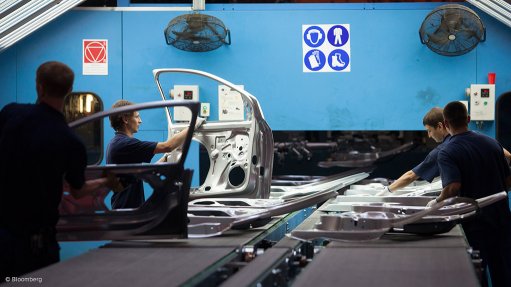
Photo by: Bloomberg
Over a week after the National Union of Metalworkers of South Africa (Numsa) called off a four-week strike in the retail motor industry, and over four months since the Retail Motor Industry Organisation (RMI) embarked on wage negotiations to reach a multiyear wage deal with the union, a collective agreement was finally signed by all parties on Tuesday.
The agreement may now be formally submitted to the Department of Labour for promulgation and extension to the entire industry.
The three-year wage deal, which would be implemented from September 1, 2013, would see employees in the component manufacturing sector receiving a 10% increase in year one, and increases of 8% in years two and three.
Employees in other sectors of the retail industry would receive a 9% increase in year one, and increases of 8% in years two and three.
The current settlement in the retail motor industry came more than two weeks after a settlement was initially reached in the fuel retail industry, which would see workers receiving an 11.6% increase in year one and increases of 9% in years two and three.
RMI received confirmation on October 6 that Numsa had called off the industrial action in the retail motor industry, which started on September 9, following a final wage offer it presented to the union on September 29.
“This officially brings to an end four weeks of industrial action and months of bargaining. As much as the RMI is disappointed with how long it took to resolve the strike and, in particular, the impact it had on the industry and the economy – most notably the component manufacturing, automotive manufacturing and service station sectors – we are glad that it has ended,” RMI CEO Jakkie Olivier said in a statement on Tuesday.
He said the strike had resulted in a reported 75% drop in automotive exports and possible forfeiture of planned international investments in the local automotive industry.
“All the negative side-effects can now be rectified and, as a whole, the industry can focus on recouping the loss in production in the sectors most heavily hit by the industrial action.
“In doing so, we can attempt to return to a position where businesses in the retail automotive aftermarket and component industry can plan and forecast the future without the threat of further disruptions and strikes,” Olivier commented.
He added that the strikes were unfortunate and that as certain sectors and employers were used as a benchmark in setting the new wages, many of the 180 000 business and 280 000 employers were forced to make "unaffordable concessions".
He appealed to industry stakeholders to consider collective bargaining in the future to avoid damaging disruptions.
“I firmly believe that an industry stakeholder indaba to analyse the events of the past few months, including the negotiations and strike action, and map the future is much needed. This would allow all stakeholders involved to find mutually acceptable solutions and cement the future stability of the industry,” he concluded.